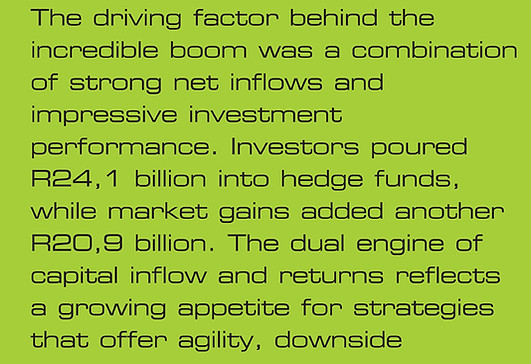
During 2024, South Africa’s hedge fund industry closed its most successful year on record, with assets under management (AUM) soaring to R152,7 billion — a staggering 43% year-on-year increase. This surge, revealed in the latest Novare Hedge Fund Survey, marks the fastest growth rate since the survey began two decades ago and signals a turning point for an industry long considered niche.

The R45,9 billion increase in AUM not only reflects robust investor confidence but also eclipses the entire size of the industry before 2013. This milestone underscores how hedge funds are evolving from specialist vehicles into mainstream investment options.
Hedge funds are finally starting to earn their place in investors’ portfolios as they consistently prove their value.
The driving factor behind the incredible boom was a combination of strong net inflows and impressive investment performance. Investors poured R24,1 billion into hedge funds, while market gains added another R20,9 billion. The dual engine of capital inflow and returns reflects a growing appetite for strategies that offer agility, downside protection, and absolute returns.
The democratisation of hedge fund investing
Of the 152 funds managed by 64 managers surveyed by Novare, 70 are classified as Qualified Investor Funds (QIFs), managing R78,98 billion, or 51.7% of total AUM. Retail Investor Funds (RIFs) closely follow, with 78 funds managing R72,06 billion, or 47.2% of the market.
Retail investors played a pivotal role, contributing R22 billion in inflows, as platforms such as Linked Investment Service Providers (LISPs) and Discretionary Fund Managers (DFMs) make these products more accessible.
Furthermore, retail funds recorded just over R3 billion in redemptions, resulting in net inflows of around R19 billion. Performance gains added a further R7,5 billion. Meanwhile, QIFs attracted R6 billion in inflows and R2,5 billion in outflows, netting R3,5 billion in new capital – but delivered stronger returns, contributing an estimated R13 billion in performance gains.
Unlike RIFs, QIFs are allowed to pursue more complex and less liquid investment strategies, giving them greater potential to generate alpha, or outperformance relative to the market, by tapping into niche opportunities that fall beyond the stricter regulatory limits imposed on retail funds.
More than 70 hedge funds now offer daily pricing, making them more accessible and thereby broadening their availability to the hedge fund market for a wider range of financial advisers and retail investors.
Strategy trends, institutional dynamics, and a maturing market
Multi-strategy funds led the charge, growing by 84% to R21,3 billion, as investors sought diversified approaches to navigate market volatility.
Equity Long/Short – Long Bias strategies remained dominant (assets climbed 39% to R66,7 billion), while Short Bias funds saw a dramatic 243% rise, albeit from a small base.
Growth was widespread across strategies, with some sectors standing out. Multi-strategy funds, which combine different investment approaches to reduce risk and enhance flexibility, experienced the fastest growth among the main categories, increasing by 84% to R21,3 billion, as investors sought more diversified solutions.

Despite broader access, institutional dominance persists. The top 10 managers now control 69% of all hedge fund assets, up from 65% last year. Interestingly, mid-sized managers - those overseeing R500 million to R1 billion - delivered the highest average returns at 21.3%, outperforming both larger and smaller peers.
Evolution is more noticeable when it comes to fees, which are beginning to shift as competition and investor scrutiny intensify. While management fees remain typically between 1% and 2%, and the 20% performance fee remains standard, some newer funds are adopting more streamlined pricing models. There’s a gradual move towards lower-cost or performance-only fee structures that better align managers’ incentives with investor outcomes.
With evolving fee structures, increased transparency, and rising interest in AI-driven strategies, South African hedge funds are maturing into a core component of diversified portfolios. Going forward, managers emphasise several priorities to help boost as well as foster growth and inclusion, such as investor education, especially through digital channels. Industry stakeholders are also calling for clearer regulation, particularly regarding tax treatment and portfolio exposure limits.
Ultimately, all of these driving factors are culminating in the hedge fund industry no longer being a fringe player and 2025 being the perfect time to invest.
Mbhele is a Portfolio Manager | Novare Holdings











